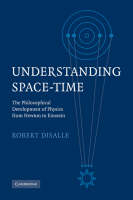
Understanding Space-Time
The Philosophical Development of Physics from Newton to Einstein
Seiten
2006
Cambridge University Press (Verlag)
978-0-521-85790-1 (ISBN)
Cambridge University Press (Verlag)
978-0-521-85790-1 (ISBN)
Presenting the history of space-time physics, from Newton to Einstein, as a philosophical as well as a scientific development, DiSalle shows how philosophical arguments and analyses impacted on these revolutionary changes in the history of physics.
Presenting the history of space-time physics, from Newton to Einstein, as a philosophical development DiSalle reflects our increasing understanding of the connections between ideas of space and time and our physical knowledge. He suggests that philosophy's greatest impact on physics has come about, less by the influence of philosophical hypotheses, than by the philosophical analysis of concepts of space, time and motion, and the roles they play in our assumptions about physical objects and physical measurements. This way of thinking leads to interpretations of the work of Newton and Einstein and the connections between them. It also offers ways of looking at old questions about a priori knowledge, the physical interpretation of mathematics, and the nature of conceptual change. Understanding Space-Time will interest readers in philosophy, history and philosophy of science, and physics, as well as readers interested in the relations between physics and philosophy.
Presenting the history of space-time physics, from Newton to Einstein, as a philosophical development DiSalle reflects our increasing understanding of the connections between ideas of space and time and our physical knowledge. He suggests that philosophy's greatest impact on physics has come about, less by the influence of philosophical hypotheses, than by the philosophical analysis of concepts of space, time and motion, and the roles they play in our assumptions about physical objects and physical measurements. This way of thinking leads to interpretations of the work of Newton and Einstein and the connections between them. It also offers ways of looking at old questions about a priori knowledge, the physical interpretation of mathematics, and the nature of conceptual change. Understanding Space-Time will interest readers in philosophy, history and philosophy of science, and physics, as well as readers interested in the relations between physics and philosophy.
Robert DiSalle is Associate Professor, Department of Philosophy, University of Western Ontario. His publications include a contribution to The Cambridge Companion to Newton (2002).
1. Introduction; 2. Absolute motion and the emergence of classical mechanics; 3. Empiricism and apriorism from Kant to Poincaré; 4. The origins of significance of relativity theory; 5. Conclusion.
| Erscheint lt. Verlag | 27.4.2006 |
|---|---|
| Verlagsort | Cambridge |
| Sprache | englisch |
| Maße | 160 x 235 mm |
| Gewicht | 449 g |
| Themenwelt | Naturwissenschaften ► Physik / Astronomie ► Relativitätstheorie |
| ISBN-10 | 0-521-85790-2 / 0521857902 |
| ISBN-13 | 978-0-521-85790-1 / 9780521857901 |
| Zustand | Neuware |
| Haben Sie eine Frage zum Produkt? |
Mehr entdecken
aus dem Bereich
aus dem Bereich
Autobiographische und wissenschaftliche Reflexionen
Buch | Softcover (2022)
De Gruyter Oldenbourg (Verlag)
CHF 55,90
Von Null auf Lichtgeschwindigkeit
Buch | Softcover (2021)
De Gruyter Oldenbourg (Verlag)
CHF 83,90
Buch | Softcover (2012)
Springer Berlin (Verlag)
CHF 89,95


